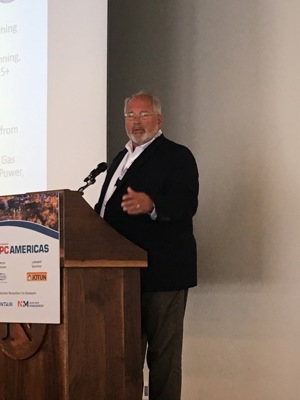IRPC Americas '17: Best practices should not be sacrificed for cost and schedule
Adrienne Blume, Executive Editor
HOUSTON—Stephen L. Cabano, President of Pathfinder LLC, spoke on the recognition vs. application of best practices for capital projects on the second day of Gulf Publishing Company's International Refining and Petrochemical Conference (IRPC) Americas 2017.
A typical project delivery process has five phases: (1) project planning, (2) analysis of the best solution, (3) basic engineering, (4) execution (engineering, procurement and construction) and (5) operation and evaluation.
"Every owner that we work with has more opportunities than cash," Mr. Cabano said. This is why it is important to provide the best opportunities available to owners during the initial business planning stage.
According to the Independent Project Analysis (IPA), approximately 65% of all mega-projects fail due to cost overruns or delays (98%). The average cost increase is 80%, and the average schedule slippage is 20 months, Mr. Cabano said. Research by Pathfinder found that at least 75% of mega-projects experience an overrun of 25% or more.
"So, why do projects fail?" Mr. Cabano asked. "Is it a function of not doing best practices, or is it because these aren't really best practices, or are we just not listening?"
Best practices in project planning. Mega-projects tend to be complicated by their long durations, during which many economic and profit swings may occur. "It's very hard to hit a moving target in the capital project world when your business case is constantly changing," Mr. Cabano noted.
An extensive number of interfaces and communication links may also complicate the execution of mega-projects. Turnover and resources changes can play a problem, as well. Contractors are assembled on a project-by-project basis and may be strictly budgeted, which can prove a challenge for projects. "We are so cost-conscious now, and we tighten the screws so much on large projects that there's no room for the contractors to improve," Mr. Cabano said.
Unrealistic objectives and targets established during early planning can also lead projects astray, and do not represent best practices. "Best practices are often overshadowed by management influences," Mr. Cabano said. "Scope becomes reduced. So how do we correct these issues? Best practices do work, as proven by case study after case study. But we must continue to reply on continuing to execute those best practices that are built into our projects. They can't be replaced by software—this is still a people-driven business."
Communication is key. A lack of communication between people—owners and management, management and contractors, etc.—is often to blame for project failure. Business leaders must be educated on the attributes of project execution. Innovative ways to address issues—such as greater standardization, modular units and preassemblies, and innovative contractual agreements—also help drive success.
In summary, Mr. Cabano said, "We need to allow the project teams time to implement best practices; some of the projects need to start earlier. We can't compress these projects into short time frames and expect that people can implement these best practices and get the right data."
Also, it is essential that business leaders listen to the messages best practice implementation send, rather than focusing only on budget and schedule, Mr. Cabano said.
IRPC Americas 2017 is taking place at Norris Conference Center–CityCenter in Houston, Texas, from 18–19 July.







Comments